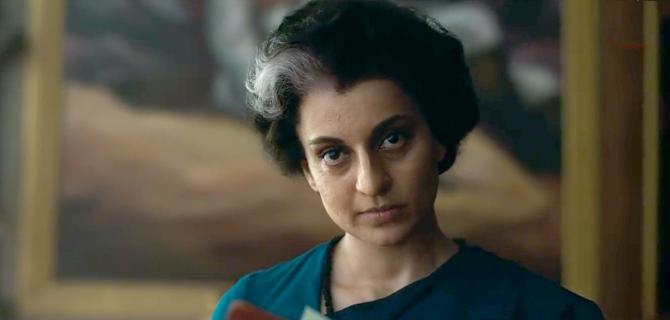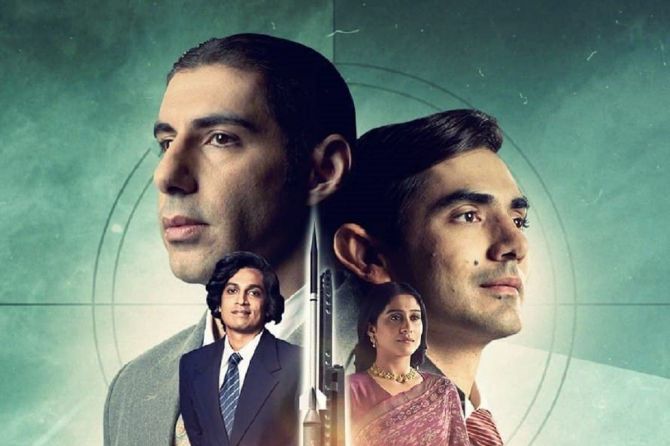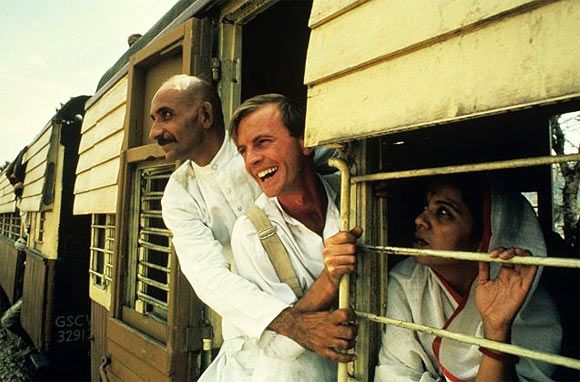They try to hide behind the smokescreen that these are works of fiction inspired by real events.
So, you can pick and choose from facts and fictionalise to push the right triggers with your audience or appease the powers that be, observes Shekhar Gupta.

Rest assured, this isn't another piece of writing on Anubhav Sinha's Netflix series, IC-814: The Kandahar Hijack.
Rather, it serves to spark this larger argument on the insurmountable and often physically dangerous challenge of creating any work of art, literature, movie, or television series drawing from any chapter or personalities of our contemporary history.
The IC-814 controversy erupted in the same week that the release of Kangana Ranaut's Emergency has been withheld.
Yet another contemporary history-themed movie, Farhan Akhtar's 120 Bahadur, has begun its pre-release promotions.
This film portrays the heroic last battle of the storied Charlie company of the Kumaon regiment (C Company, 13 Kumaon) in Ladakh's Rezang La in 1962.
This shows film-makers see the juice in historical realities.
However, the challenge of staying true to the complete truth remains formidable.
Why, for example, has Kangana Ranaut's film got into trouble?
Usually, you would've expected it would pass through the system like a breeze, joining the already large repertoire of garden-variety Gandhi-family bashing films thriving in the Modi era.
Given that Ms Ranaut is now a member of Parliament from the Bharatiya Janata Party, you would expect to see Mrs Gandhi in her most self-destructive phase, particularly during the period when she was dismantling the Constitution.
The BJP has just suffered electorally because an impression grew that it wanted a large Lok Sabha majority to do precisely this.
The BJP's main weapon of counterattack, the Brahmastra, has been Indira Gandhi's subversion of what Narendra Modi has exalted as a sacrament.
One of Hindi cinema's finest actors today would now be playing Indira Gandhi in her authoritarian avatar. Wonderful idea, no?
Nobody would've expected this movie to get anything but tender love and care, an avalanche of tweets, instant reviews in praise, and support and selfies with Kangana from those in the establishment or vying for its attention.
So where did it all go so wrong?
Whether the film is good or bad, I can't say, as I have only seen the trailer.
It promises a loud, juvenile, simplistic fare, with characters, including Kangana as Indira, looking like overly powdered AI versions of the original.
I also don't know yet if the film identifies him as Jarnail Singh Bhindranwale, but an actor seemingly playing him is first seen emerging from jail and later speaking to an audience of Sikhs, rhetorically sending a message in Punjabi to the Congress: 'Your party wants votes, and we want Khalistan'.
This has triggered an almighty Sikh outrage, with the venerable Shiromani Gurdwara Parbandhak Committee (SGPC) stepping in.
The film is in trouble not because it paints Indira Gandhi as evil and puts in her mouth words she never spoke.
Ranaut's Mrs Gandhi is seen in the trailer saying, 'Indira is India, India is Indira'.
Mrs Gandhi never said this. It was actually Dev Kanta Barooah, then Congress president, who said this at the All India Congress Committee session in Guwahati in the winter of 1976.
This was peak Emergency and in that season of competitive sycophancy, Borooah spoke the line that damned his legacy.

In the early 1980s, I would sometimes drop by at his home in Nowgong, where he spent his years in political retirement and wilderness.
He would often fret over that one "indiscretion."
Did Mrs Gandhi ever say that herself? Not that I know from any readings.
Of course, now I have seen Ms Ranaut say that in the Emergency trailer. This is fake news.
The Congress people, however, aren't the ones protesting.
The Bhindranwale reference becomes necessary because the pretended biopic must also make the point that she invited the assassination upon herself by playing fast and loose with Sikh separatism.
There's enough evidence in contemporary history that in the very early stages, the Congress, especially Giani Zail Singh, patronised Bhindranwale in the hope that he could embarrass the Shiromani Akali Dal in SGPC elections.
That adventurism failed, but Bhindranwale grew into a force.
The movie's message is: Indira Gandhi was so power hungry, she was willing to trade votes for Khalistan with Bhindranwale.
As a reporter who met him dozens of times between the summer of 1983 and the hour when the first army units moved in for Operation Blue Star, I never heard Bhindranwale demand Khalistan. Nor did anybody I know.
There are hundreds of hours of tapes of his speeches available.
He never said Khalistan, whatever the subtext of his message, innuendo, or actions.
All of us reporters asked him the 'K question' at some point.
His pre-rehearsed answer was: I never asked for Khalistan, nor am I asking. But if 'bibi' (for Indira Gandhi) or 'Dilli Durbar' gives it to me, I won't say no.
Short lesson: You can still put words in Indira Gandhi's mouth and get away with it, but you might also end up messing with Bhindranwale 40 years after his death.

One reason all of these films and teleserials get into trouble is that they try to hide behind the smokescreen that these are works of fiction inspired by real events.
So, you can pick and choose from facts and fictionalise to push the right triggers with your audience or appease the powers that be.
Convenient facts plus loaded fiction equals odious propaganda.
Check out the two-season Rocket Boys on SonyLiv. It picked real, heroic, lives: Homi Bhabha, Vikram Sarabhai and grew fictional by the episode.
The great Dalit physicist Meghnad Saha was depicted as a Muslim, deeply jealous of Bhabha, with the CIA and other conspiracy theories coming into play.
The nonsensical defence for this doctoring was creative liberty.
The fact is that we are still too thin skinned to accept anything but deification of our leaders, biopics, or biographies.
We are growing pricklier by the day, and anything that India did wrong cannot pass.
Unless, of course, it can be blamed on the Nehru-Gandhis.

An honest, truthful biopic on Ambedkar, Shivaji, M Karunanidhi, Balasaheb Thackeray, Rani of Jhansi, Kanshi Ram, Bhindranwale, just about anybody is impossible.
This runs across the subcontinent and is the reason why some of our most important public figures have had defining biographies written by foreigners.
The biographies on Jinnah and Bhutto by University of California Professor Stanley Wolpert, for example.
Even the film Gandhi was made by a foreigner.
When Richard Attenborough once told Nehru that he intended to make a Gandhi biopic, the advice he got was -- don't deify him and show him as he was, warts and all. Will this pass today?

Forget politics. Our sporting biographies and biopics are ghost-written, co-produced by the stars themselves.
Movies on our military history, famous battles, from Border to Uri and multiple nonsensical ones on Kargil, wallow in the same malaise.
Not for us Indians a Clint Eastwood who would do a Flags of our Fathers and then a sequel to look at the heroism from the Japanese side with Letters from Iwo Jima.
In what passes for an Indian war film, the Pakistanis are idiots, cowardly, comical and very Islamic, flowing beards and all.
Remember Border? Let's see how Farhan Akhtar portrays the Chinese.
We are so sensitive that we even took umbrage at that one reference from the Bhagvad Gita in a bedroom conversation in Oppenheimer.
That a film-maker must deal with this awful degree of difficulty in producing anything honest is understandable.
The ploy of calling it fiction, but picking enough suitable facts to make your story look credible is creative and intellectual dishonesty.
It distorts history, maligns some, and glorifies others unfairly.
And, of course, it can sometimes get your movie blocked -- so what if you have the entire establishment behind you?
By special arrangement with The Print
Feature Presentation: Aslam Hunani/Rediff.com












 © 2025
© 2025